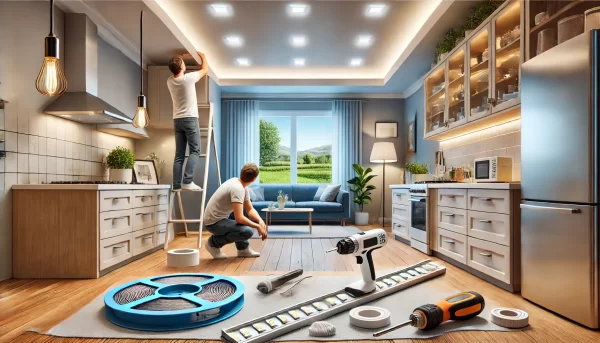
LED lights have become the go-to choice for homeowners looking for energy-efficient, long-lasting, and versatile lighting solutions. Their durability and low energy consumption make them an excellent investment for both indoor and outdoor spaces. However, to get the most out of your LED lighting system, proper installation and maintenance are essential.
This guide walks you through the steps of installing LED lights, offers tips for their upkeep, and explains why they are a superior choice for modern lighting.
Benefits of LED Lights
LED lighting offers numerous advantages over traditional bulbs, making it an ideal choice for households and businesses.
Energy Efficiency
LED lights use significantly less energy than incandescent or halogen bulbs, reducing electricity costs while providing brighter illumination. Their efficiency also means less heat production, which contributes to their long lifespan.
Longevity
One of the standout features of LED lights is their durability. On average, an LED bulb lasts 20 times longer than a traditional bulb, making it a cost-effective solution for long-term use.
Versatility
LED lights come in a variety of designs, colors, and brightness levels. From accent lighting to outdoor floodlights, LED technology offers solutions for virtually any lighting need.
How to Install LED Lights
Proper installation ensures your LED lights perform at their best. While some installations are straightforward, others may require professional expertise.
Selecting the Right LED Lights
Before installation, consider the purpose of your lighting. Bright white LEDs work well in task-oriented areas like kitchens or offices, while warmer tones are better suited for living spaces. Visit comprehensive resources on lighting solutions to explore different LED options tailored to your needs.
Tools and Preparations
Make sure you have the necessary tools, including screwdrivers, wire cutters, and a voltage tester. Always switch off the power at the circuit breaker before beginning any installation.
Steps for Installation
- Remove Existing Fixtures: If replacing old lights, carefully remove the previous fixture and disconnect the wiring.
- Connect LED Fixtures: Match the wires from the LED fixture to those in your ceiling or wall. Use wire connectors to secure them.
- Secure the Fixture: Attach the LED fixture to the mounting bracket or housing.
- Test the Light: Once installed, restore power and test the light to ensure proper functionality.
For more complex setups, such as outdoor or recessed lighting, consider hiring a licensed electrician to ensure safety and compliance with local codes.
Tips for Maintaining LED Lights
Regular maintenance extends the lifespan of your LED lights and ensures consistent performance.
Cleaning Fixtures
Dust and debris can accumulate on light fixtures, diminishing brightness. Clean your LED fixtures periodically using a soft, dry cloth or a gentle cleaning solution for tougher grime. Avoid using abrasive materials that might scratch the surface.
Checking Connections
Loose connections can cause flickering or inconsistent performance. Inspect the wiring and connectors occasionally to ensure everything remains secure.
Avoid Overheating
LED lights are designed to stay cool, but improper installation or excessive dirt can trap heat. Ensure adequate ventilation around the fixture and avoid covering lights with materials that could block airflow.
When to Upgrade or Replace
Despite their durability, LED lights may eventually need to be replaced. Signs such as flickering, reduced brightness, or discoloration indicate it’s time for an upgrade. If you’re considering enhancing your lighting setup, explore advanced lighting solutions for modern and energy-efficient options.
Why LED Lights Are a Smart Choice
LED lights offer unmatched energy savings, versatility, and durability, making them an ideal solution for modern homes. Their long lifespan and low maintenance requirements reduce both costs and environmental impact, while their adaptability allows for creative lighting designs that enhance any space.
Final Thoughts on LED Lighting
Installing and maintaining LED lights is a straightforward process that yields significant benefits in terms of energy efficiency, longevity, and aesthetic appeal. Whether you’re upgrading your home’s interior, adding outdoor security lights, or creating a custom ambiance, LED lights are the perfect solution.
Invest in high-quality LEDs and follow proper installation and maintenance practices to enjoy reliable, energy-efficient lighting for years to come. To explore innovative lighting solutions and find inspiration for your next project, check out the range of options available in lighting solutions.
